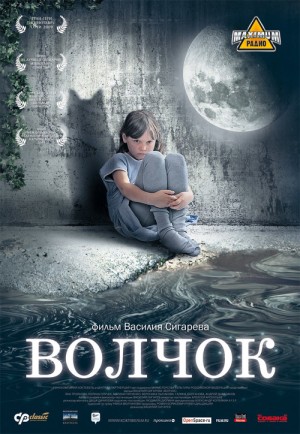30 January 2014
To start, this film is narrated by the story of the daughter but in the voice of the mother. Why might this be? Yana Troyaova, the actress who plays the mother, claims that this story is based on of her own mother. As Vasiliy Sigarev’s inspiration for the script, Yana probably grew up fearing that she would grow up to be her mother. Her biggest fear seems to come to life on the screen as we see how twisted and strange the daughter grows to be and especially with the mother’s voice narrating her story as if she were the daughter, herself. Maybe Yana thought that taking on the role of her own mother on the screen would help her understand her own mother.
The daughter only wanted the love of her mother. She absolutely adored her from the moment she finally met her, seven years into her life. Her desperation for her mother’s love is heartbreaking. At one point she even tries to enter her mother’s sphere of interest by initiating a sexual act. After this, we see the mother cry, finally showing some emotion. For the cruel and heartless mother to even cry at this shows just how sorrowful and sickening the desperation had become.
Even when the mother leaves her at the train station and returns many years later, she still does not want her to go. The daughter’s love for her mother is unconditional. This is what makes it so sad.
The mother, however, feels nothing for her daughter. She gives her a top at the beginning of the story (called a volchok). Then, she tells her daughter that she did this for a reason. The reason was because mother had found daughter in a sack in the cemetery, as a baby wolf (also called volchok). This is because the mother just sees her daughter as an inanimate object: a toy. Yet, she is scared of her daughter. This is especially evident in the final scene where she runs from her daughter, quite literally, and then has a good laugh when she loses her. She laughs as if she had won a game. She then continues on with her life. She continues to run from monsters, her daughter being one of them.
Another interesting part of the film was that the daughter’s mantra was “I don’t know.” Whenever her mother would ask her why she did anything, she would reply”I don’t know.” She did not even know the town she lived in or the nearest city. It seemed to be the answer to the question always on her mind: Why doesn’t mother love me?
She waits for her mother, always. She dresses up for her. She defends her from the drunk man, at the beginning. She loves her mother unconditionally. So then why not love her?
Once again, fear. Fear of a ruined future. Fear of love. The mother feared the daughter and therefore did not love her.
—
The documentary, Mom, I’m Gonna Kill You, shows children who come from similar situations as the daughter in the film.
One of the orphans, Nastya, is happy all the time and says that she loves everybody. To her, her mother is sick. She wants to become a doctor to cure her. The reality is that her step-father killed her mother. When somebody tell her this, she does not belive it. She refuses to believe it. Just like the daughter in Wolfy, Nastya would rather believe the lie. There is a scene in Wolfy where the daughter narrates how she would tell her ghost friend all about how her life was so wonderful and how she would believe these lies, herself, the biggest one being that her mother loved her.
Other orphans in the documentary had mothers that did not want them, just like the daughter in the film. Two boys in particular, Sasha and another one, stated that they would kill their mothers. Living as unwanted children, they started to harbor hate. Everything the world has thrown at them, their deceiving and awful orphanage, is the mother’s fault because she is letting this happen. She does not do her duty as a mother.
Similarly to Sasha, the daughter in Wolfy also harbors a lot of resent. We see this in the scene where that daughter suffocates and annihilates the hedgehog her mother gave her.
Again, this is exactly why the mother in Wolfy keeps running from her daughter. She knows that her daughter will finally start to resent her enough to take her life.
—
Between the film and the documentary, I was left absolutely heartbroken. To know that there are women out there who fear and hate their children… to see that these children in Russia pay for their parent’s sins by being labeled unfit for normal society. Social orphans already feel like there is no place for them. The institutions are just confirming this feeling instilled by their parents rather than helping them by integrating them into society. Then, the caring volunteers come and leave for good, forever reminding these children on how their parents walked out on them.
At the end of film and documentary, the most positive message that can be seen is delivered by the sister in the film when she angrily says something like: ‘you gave birth to this child. it is your responsibility to take care of her.’

